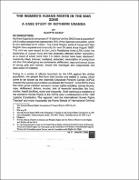| dc.description.abstract | Northern Uganda is composed of 16 districts and by 2003 it had a population of 6.5 million people that represented 35% of the Ugandan population, which is now estimated at 31 million. The Acholi region, parts of lango and teso region have experienced insecurity for over 20 years since august 1986. this civil war was waged by the lord’s resistance army (LRA) under the leadership of joseph kony and has adversely affected civilian population as a result of which more than 1.6 million people have been displaced massively killed, tortured, mutilated, abducted, conscription of young boys into the LRA rebel group as combatants, defilement, rape and sexual abuse of young girls and women, forced into marriages and pregnancies and destruction of property.
Owing to a series of attacks launched by the LRA against the civilian population, the people fled from their homes and settled in camps which came to be known as internally displaced persons camps (IDPCs) where in the women and children constituted 80 percent. In the IDPCs there has been gross violation women’s human rights including: sexual abuses, rape, defilement, toutre, murder, and lack of essential amenities like food, shelter, health facilities, water and insecurity. Such continuous violations of the women’s human rights in the IDPCs was in contravention of the 1995 Uganda constitution , the regional and the international human rights treaties and more importantly the Rome statute of international criminal treaties and more importantly the Rome statute of international criminal court (1998) to all of which Uganda is a signatory.
The worsening of the Human Rights situation in the IDP camps coupled with persistent mass killings by the LRA, and the lukewarm response by LRA towards the call for embracing the Amnesty policy prompted President Yoweri Museveni to refer the matter to the International Criminal Court (ICC) with a view of prosecution. The ICC made its investigations of the crimes and established that LRA rebels have committed war crimes and crimes against humanity which should be accounted for .Arrest warrants were issued against the five LRA rebel commanders but these warrants have not been executed yet. | en_US |

